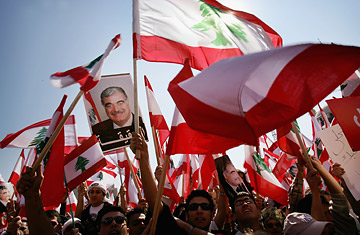
Protestors carrying banners and flags gather in Martyrs Square one month after the killing of former Prime Minister Rafik Hariri March 14, 2005 in Beirut, Lebanon. The demonstration was part of a month of protest against Syrian forces in Lebanon.
Three years ago Friday, some 1 million Lebanese — around one quarter of the entire population — poured onto the streets of central Beirut to demand an end to Syria's long domination of Lebanon. That demonstration was the pinnacle of the independence intifadeh, dubbed the "Cedar Revolution" by a Bush Administration looking to transform the Middle East, and it overturned the existing pro-Syrian order in Lebanon, inspiring a new generation of political activists to press for deeper changes in Lebanese society.
That was then.
Today, Lebanon faces its gravest crisis since the end of the 1975-1990 civil war, as anti- and pro-Syrian Lebanese factions remain hopelessly deadlocked in their battle over the presidency, and the heady aspirations of those young activists have given way to disillusion and despair.
"The independence intifadeh was supposed to be the dawn of a new era and it turned out to be completely false," says Rudy Jaafar, a board member of Nahwa al-Muwatiniya — Arabic for "Toward Citizenship" — a democracy advocacy group that emerged in the wake of the Beirut Spring.
The anniversary of the 2005 rally was marked Friday in Beirut by the first formal convention of the March 14 parliamentary bloc, the coalition of anti-Syrian parties named in honor of that historic protest. The group is composed of Sunni, Christian and Druze parties, and is the political support base of the Western-backed government. Its leaders hope to turn the sometimes unwieldy coalition into a more structured political organization.
But many Lebanese have grown tired of the unrelenting crisis of political gridlock, sporadic assassinations, bombings and street violence, as well as a worsening economy. Fed up with ceaseless bickering of politicians from the March 14 bloc and the pro-Syrian opposition, led by the militant Shi'ite Hizballah movement, Lebanese are emigrating in droves to the wealthy, job-rich Gulf or further afield.
"Having to deal with explosions, assassinations, the invasion of downtown Beirut [by a 16-month opposition sit-in] and the constant threats suddenly puts changing the actual system quite low on your list of priorities," said Asma Andraos, president of the 05Amam civil society group.
The spring of 2005 had turned Beirut, briefly, into the frontline of the Bush Administration's flagging battle to democratize the Middle East. The spectacle of hundreds of thousands of Lebanese waving national flags and clogging the streets of the city center conjured up irresistible comparisons with the popular revolutions that had overturned regimes in former Soviet republics. And its young activists spoke of abolishing the sectarian distribution of power on which Lebanon's constitution is founded. But following Syria's troop withdrawal from Lebanon six weeks after the March 14 rally, it was back to business as usual: Lebanon's established political bosses briefly set aside their differences to cut electoral deals to maintain their own grip on power, while cold-shouldering the young activists. The dismayed Cedar Revolutionaries realized that changing the system would not be as easy as they had initially hoped
"It's going to take more than a couple of marches and a few days in tents to change a system that has been around for centuries," Andraos said.
Despite the gloom, the activists are quietly but doggedly pursuing their effort to build a progressive and secular Lebanese society.
The 05Amam group is encouraging schools to hold elections for mock local councils, to teach democratic governance. Elie Khoury, a top Lebanese advertising executive turned political campaigner, is using his creative skills and private sector funding to try and revive a jaded public's appetite for the original March 14 goals of democracy and freedom.
"We have to keep reminding them that it's not about March 14 and the opposition, but whether they want to live in a democratic state or live in a Hanoi fighting endless wars," Khoury said. A group called Haya Bina, Arabic for "Let's go", has adopted a harder-edged political goal of encouraging new voices in Lebanon's Shi'ite community to weaken the dominance of Hizballah.
But their efforts often are frustrated by the political situation. Nahwa al-Muwatiniya has been unable to implement a project to monitor the performance of Lebanese lawmakers because parliament has not convened for more than a year.
The deadlock has even spawned a new advocacy group: Khalass, Arabic for "Enough!" was created following a deadly riot in January 2007 when Sunni and Shi'ite students fought each other in central Beirut. The group has held a series of sit-ins outside the empty parliament building and even a mock funeral procession past the homes of politicians. Although it has garnered more than 40,000 signatures on a petition calling for a peaceful solution to the crisis, it has yet to make an impact on the country's political rulers. "We feel impotent. We're not capable of influencing the leaders," said Gilbert Doumit, a Khalass activist.
For a country struggling to stave off internal violence and economic ruin, the lofty dreams of a peaceful, democratic and secular future seem further away than ever.
